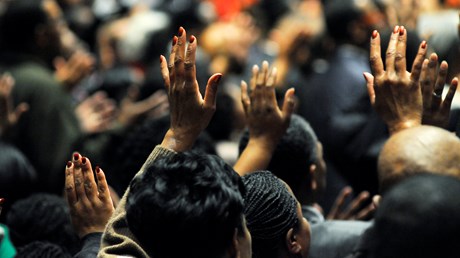I have to let go of how inappropriate it feels to approach Christ with such boldness.

“Come on and lift your hands to honor God right now,” my church’s worship leader exhorted the congregation. We sang the chorus for “I Will Exalt You.” Across the room, arms began rising in a physical amen. I hesitantly lifted my hands straight in the air.
It was not comfortable. I grew up in predominantly Korean American congregations where hands rarely rose above elbow level. Any movement was self-contained—clapping, maybe a slight side-to-side sway. That Sunday, I raised my hands because frankly, other people were doing it. I was attending a new church, predominantly African American, which unlike the services in which I grew up, embraced exuberance and movement during worship.
Lost in the music, I remembered recently watching two more videos of police killing black men. Michael Brown’s death in Ferguson had sparked the rise of the Black Lives Matter movement and coined a catchphrase protesting police brutality: “Hands up, don’t shoot.
As the band played in the background, I thought of the tired arms of distressed black men, women, and children facing police officers. I considered the weariness of people protesting police brutality, reclaiming their hands up in nonviolent dissent as they marched in the streets, highlighting the absurdity of violent death while in such a yielding posture.
A Single Body
That Sunday forced me to reconsider my experience of worship and how it was formed by my culture. In the Presbyterian Korean American churches of my childhood, I was taught to approach God from a posture of dependence and deference. Open hands symbolized my congregation’s desperate need for a material and spiritual provider. Elbow-level arms suggested our humility and …
Source: Christianity Today Most Read